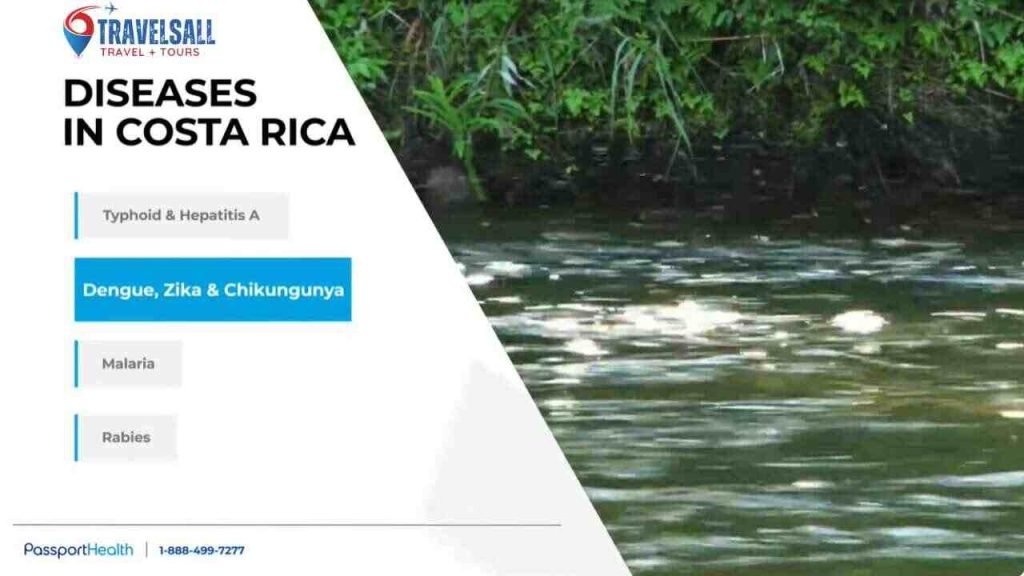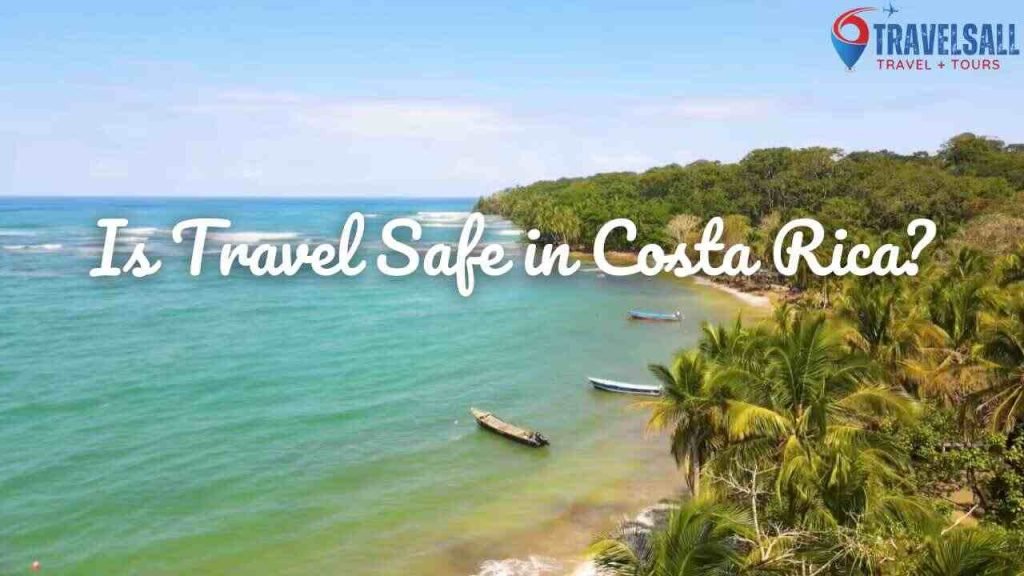Travel Safe in Costa Rica is generally safe for tourists. Vigilance and common sense should ensure a secure visit.
Costa Rica warmly welcomes travelers seeking rich wildlife, tropical beaches, and vibrant culture.
Known for its political stability and friendly locals, this Central American gem emphasizes eco-tourism and adventure.
Nevertheless, like any travel destination, it presents some risks. Pickpocketing and petty theft are the most common crimes facing tourists, so always watch your belongings.
Adventure seekers should heed safety briefings, particularly when engaging in activities like zip-lining or whitewater rafting.
Transportation, especially on rural roads, can be challenging, so consider reliable tour operators for excursions.
By staying informed about local conditions and respecting nature’s power, your Costa Rican journey can be both exhilarating and secure.
Table of Contents
ToggleIntro To Costa Rican Travel

Costa Rica, a jewel of Central America, entices adventurers with its lush rainforests, pristine beaches, and vibrant wildlife.
This tropical sanctuary promises an unforgettable journey for all who visit. With a reputation for peace and democracy, its allure extends beyond the natural wonders to a respect for life and freedom.
Travelers from around the globe seek out Costa Rica for its harmonious blend of ecotourism, adventure, and relaxation.
Why Costa Rica Draws Travelers
- Biodiversity: Home to 5% of the world’s species.
- Adventure: Ziplining, surfing, and hiking await.
- Conservation: Leader in environmental protection.
- Pura Vida lifestyle: Embrace the local way of living.
- Warm climate: Year-round sun offers endless summer.
- Cultural richness: Vibrant traditions and history.
General Safety Perception
Visitors generally find Costa Rica to be a safe destination. The nation boasts a stable political climate and has no army.
It often ranks high on the Global Peace Index. Tourist areas maintain a strong security presence to ensure visitor safety.
Petty crime does exist, as in any travel destination, and standard precautions are advised. Use safe transportation options and keep your belongings secure.
Crime Rates And Tourist Safety

Traveling ignites excitement and wonder, but safety considerations should always take precedence.
Costa Rica welcomes tourists with its lush rainforests and pristine beaches. Yet, potential travelers often ponder safety within its borders.
Mastering crime rates and measures for tourist safety are vital before embarking on a Costa Rican adventure.
Current Crime Statistics
Recent data shed light on the crime dynamics in Costa Rica. Tourists usually experience a tranquil stay, thanks to the country’s commitment to peace and order.
An analysis of statistics reveals:
- Crime rates vary by region, with some areas reporting higher incidents.
- Authorities maintain a strong presence in tourist-centric zones.
- Comparatively, Costa Rica holds a reputation for being safer than many of its neighbors.
Tourist-targeted Crimes
Focusing on crimes that specifically target tourists, Costa Rica’s government takes proactive measures.
Petty theft remains the most frequent issue, with instances occurring in crowded or unsupervised areas.
The following measures are recommended for tourists:
- Keep personal belongings secure and within sight.
- Use hotel safes for valuables when possible.
- Avoid displaying expensive items in public.
| Crime Type | Common Locations | Prevention Tips |
|---|---|---|
| Petty Theft | Beaches, Markets | Stay vigilant, use waist packs |
| Scams | Street Vendors, Taxis | Agree on prices beforehand |
| Pickpocketing | Public Transport, Crowds | Carry less cash, use hidden pockets |
Transport Safety In Costa Rica
Exploring Costa Rica is an adventure of a lifetime. But what about getting around? Transport safety is key to a worry-free trip.
Here we dig into public transportation safety and what to expect when renting a vehicle.
Public Transportation Risks
While public transportation in Costa Rica is affordable and accessible, it’s smart to stay alert. Here are common risks:
- Pickpocketing, especially in crowded areas
- Bag snatching on buses and stops
- Unscheduled stops in remote places
To stay safe, keep your belongings close and be aware of your surroundings. Always choose official buses over informal ones. Check schedules ahead of time.
Renting Vehicles And Road Conditions
Renting a car can offer freedom. However, roads can be tricky to navigate. Here’s what to expect:
| Road Feature | Condition |
|---|---|
| Highways | Generally in good condition |
| Rural roads | Often unpaved and rough |
| Signage | Sometimes lacking or unclear |
Ensure your rental is reliable. Choose a 4×4 for rural areas. Drive cautiously and plan routes with up-to-date maps or GPS.
Health Concerns For Travelers

Exploring Costa Rica includes sunny beaches and lush jungles. Travel safety extends beyond avoiding petty theft or scams; health concerns matter too.
Knowing health risks ensures worry-free adventures. Let’s explore how to protect your health in Costa Rica.
Preventive Vaccinations
Costa Rica requires no specific vaccines for entry. Yet, wise travelers consider preventive shots. CDC and WHO suggest the following:
- Hepatitis A – Contaminated food or water can transmit this virus.
- Typhoid – Especially if venturing to smaller cities or rural areas.
- Routine Vaccinations – Measles, mumps, rubella, diphtheria, tetanus, and whooping cough shots should be up-to-date.
It’s smart to visit a travel clinic 6-8 weeks before departure. The clinic offers personalized health advice and necessary shots for your travel.
Dealing With Illnesses Abroad
Getting sick while away from home can be stressful. Costa Rica has both public and private healthcare. Private facilities often provide faster service and English-speaking staff. The best plan includes:
- Travel health insurance – Check if it covers international medical care and emergencies.
- Local emergency numbers – In Costa Rica, dial 911 for emergencies.
- Pharmacies – Known as “pharmacies”, they’re widespread and can provide medical advice for minor illnesses.
Stay hydrated and protect against mosquitos. Dengue fever and other insect-related diseases can occur. Watch out for high altitudes in certain areas like Monteverde; altitude sickness affects some travelers.
Natural Hazards To Be Aware Of
Costa Rica is a paradise for nature lovers. Yet, it does have natural hazards. Know these risks for a safe trip.
Areas Prone To Natural Disasters
Volcanoes, earthquakes, and floods hit certain areas. Here’s where you need to be extra careful:
- Northwest: Watch for volcanic eruptions.
- Coasts: Tsunamis can happen after earthquakes.
- Central Valley: Landslides are common in the rainy season.
Staying Informed On Weather Conditions
To keep safe, always check the latest weather updates. Use these tips:
- Download local weather apps: They give you real-time alerts.
- Follow social media for instant updates from local authorities.
- On TV, watch the national weather forecast.
Travel Insurance And Emergency Assistance
Exploring Costa Rica’s stunning landscapes and rich culture is an adventure like no other. Yet, unexpected events can happen anywhere.
That’s where Travel Insurance and Emergency Assistance jump in. These services act as a safety net, ensuring your trip remains worry-free.
Choosing The Right Travel Insurance
Smart travelers know the importance of choosing the right travel insurance. It’s essential for a smooth journey in Costa Rica. A good policy covers several key aspects:
- Medical emergencies – Hospitals and clinics are available, but costs can surge.
- Travel disruptions – Flight cancellations and delays can set you back unexpectedly.
- Luggage loss – Keep belongings safe but ensure coverage just in case.
Comparing policies is crucial. Look for comprehensive coverage that suits your travel needs.
Different plans exist for solo travelers, families, and adventure-seekers. Always read the fine print. This ensures no surprises if you need to make a claim.
Accessing Consular Services
Consular services are your lifeline abroad. They offer assistance during emergencies, such as lost passports or legal troubles.
Know the location and contact information of your embassy or consulate before departure.
| Service | Description | Contact |
|---|---|---|
| Passport Loss | Report and seek replacements | Local embassy/consulate |
| Legal Issues | Access legal advice and services | Consular assistance |
| Emergencies | Get help in crises | Emergency consular services |
Remember, consular services can’t provide money or legal representation. But they can guide you to the right resources. Staying informed about these services is the first step to staying safe.
Cultural Sensitivity And Respect

Starting on an adventure to Costa Rica promises vibrant experiences and breathtaking natural landscapes.
However, to truly weave into the fabric of Costa Rican culture, travelers must embody cultural sensitivity and respect.
Approaching local customs with understanding and mindfulness ensures an enriching journey and harmonious interactions with the warm-hearted “Ticos”.
Understanding Local Customs
Costa Rica thrives on its rich traditions and community-oriented lifestyle. Diving deep into these practices allows for a profound connection to the country’s soul. Here are simple yet essential customs to embrace:
- Greeting: A simple “Buenos días” (Good morning) goes a long way.
- Pura Vida: Embrace the nation’s mantra, “Pure Life”, signaling a content lifestyle.
- Environmental care: Respecto por la naturaleza, or respect for nature, is central to Costa Rican life.
Avoiding Cultural Misunderstandings
Missteps in a new cultural landscape are common, yet preventable. Keep in mind these guidelines for smooth cultural navigation:
| Tips | Details |
|---|---|
| Attire | Opt for modest clothing, particularly when visiting religious or rural sites. |
| Timeliness | While ‘Tico time’ may denote a relaxed attitude towards punctuality, always strive for timeliness. |
| Language | Learning key Spanish phrases displays effort and respect towards the local language. |
Staying Safe In Costa Rican Waters
Costa Rica’s lush landscapes and stunning beaches attract adventurers from around the globe. Yet, the ocean’s beauty comes with its hazards.
Knowing how to stay safe in Costa Rican waters ensures a joyful and secure vacation.
Riptides And Water Safety
Riptides pose a significant risk at some Costa Rican beaches. They are powerful, narrow channels of fast-moving water that can quickly pull swimmers out to sea.
- Recognize the signs: Look for water that is unusually choppy, discolored, or foamy, with debris moving seaward.
- Swim parallel to shore: If caught in a riptide, stay calm and swim parallel to the shoreline until free of the current.
- Choose lifeguarded beaches: Swim where lifeguards are present for added protection.
Be sure to check local beach flags and signage indicating current water conditions.
Safe Practices For Scuba Diving And Snorkeling
Both scuba diving and snorkeling open a world of underwater wonder in Costa Rica. Yet, safety first is a must.
| Practice | Details |
|---|---|
| Get Certified | Only dive with proper certification. Consider PADI or SSI-recognized courses. |
| Check equipment | Ensure all gear is in good condition and fits properly before diving. |
| Buddy system | Never scuba dive or snorkel alone. Always go with a buddy or a guide. |
| Respect wildlife | Keep a safe distance from marine life. Touching or feeding animals can be harmful. |
| Be weather-wise | Monitor weather conditions. Postpone activities in case of storms or rough seas. |
Remember, when underwater, conserve energy and air, and maintain a slow, steady pace to avoid overexertion.
Wildlife Interactions And Precautions
Costa Rica boasts some of the most impressive biodiversity on the planet. In this paradise, wildlife encounters happen daily.
From the call of howler monkeys to the glimpse of a resplendent quetzal, nature is always close. Safety is key, though.
Learning how to interact with wildlife ensures a safe and thrilling experience. Let’s explore the dos and don’ts of meeting Costa Rica’s wild residents.
Encountering Costa Rica’s Diverse Fauna
Costa Rica’s wildlife ranges from lazy sloths to speedy jaguars. Excitement fills the air when you spot animals in their natural habitat.
Yet, always keep a respectful distance. Use binoculars or a zoom lens to observe without disturbing.
Feeding wildlife is a strict no. It harms their health and alters natural behaviors. Stay safe and let animals stay wild.
| Animal | Safe Viewing Distance |
|---|---|
| Sloths | 10 meters |
| Monkeys | 25 meters |
| Jaguars | Always at a safe distance; follow the guide’s instructions |
Dos And Don’ts In Natural Parks
- Do: Stay on marked trails for your safety and to protect habitats.
- Do: Carry out all trash to keep parks pristine.
- Don’t: Touch or feed animals. It can be dangerous and harmful to their health.
- Don’t: Pick plants or remove natural objects. Leave everything as you find it.
Most parks offer guided tours. Guides are wildlife experts. They help spot creatures that often hide in plain sight.
They also share stories about the local ecosystem. Choose a certified guide to enrich your adventure.
- Research the wildlife you might see in advance.
- Wear neutral-colored clothing to blend in with nature.
- Be quiet and patient. Wildlife appears when least expected.
Tips From Experienced Travelers
Starting on a journey to Costa Rica? Seasoned globetrotters often share pearls of wisdom. These insights can transform your trip into a more pleasant, secure experience.
Top Safety Advice
Stay aware of your surroundings. This top tip keeps travelers safe worldwide. In Costa Rica, with its lush jungles and bustling cities, staying vigilant is key. Let’s break down the essentials:
- Avoid uninhabited areas, especially at night.
- Keep valuables out of sight. Use hotel safes when available.
- Travel in groups. There’s safety in numbers.
- Trust your instincts. If a situation feels wrong, leave.
Learning From Others’ Experiences
Many travelers have traversed Costa Rica before you. They’ve left a trail of anecdotes for you to learn from.
To keep this article punchy and concise, here are the condensed, must-know tips from those experiences:
| Experience | Lesson |
|---|---|
| Local scams | Research common scams beforehand. Be cautious with street vendors and unofficial tour guides. |
| Transport safety | Use licensed taxis or reputable transport services. Confirm prices before the journey. |
| Food and water caution | Opt for bottled water. Choose busy eateries with fresh, hot food. |
| Natural hazards | Understand the risks of riptides or active volcanoes. Follow local advice. |
Remember, forewarned is forearmed. Stay informed, and cautious, and enjoy everything Costa Rica has to offer!
Frequently Asked Questions Of Is Travel Safe In Costa Rica
Is Costa Rica Safe To Visit Right Now?
Costa Rica is generally safe for tourists, but it’s important to stay informed about local travel advisories and practice standard safety precautions. Always check current conditions before your trip.
What Not To Do When Visiting Costa Rica?
Avoid engaging in illegal drug usage, refrain from touching wildlife, do not litter, disregard local customs, or venture off marked trails in national parks. Respect environmental guidelines to ensure the preservation of Costa Rica’s natural beauty.
What Is The Safest Part Of Costa Rica?
The safest part of Costa Rica is generally considered to be the Central Valley, home to San José and surrounding areas. Low crime rates contribute to its safety reputation.
Is Costa Rica Safe For Travel 2024?
Costa Rica is generally considered safe for travelers in 2024. Exercise standard precautions and stay informed about local conditions.
Conclusion
Safety in Costa Rica is a key concern for any traveler. By taking common-sense precautions, visitors can enjoy the wonders of this vibrant country with peace of mind.
Embrace the culture, indulge in local cuisine, and explore breathtaking landscapes. Remember, a safe journey is the cornerstone of a memorable adventure in Costa Rica.



